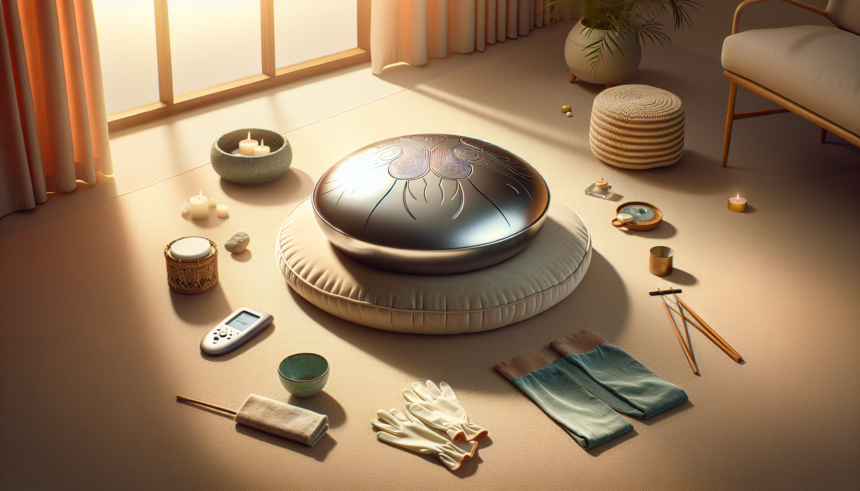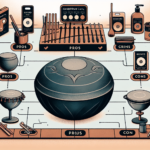The handpan, with its captivating sound and sculptural aesthetics, is a remarkable instrument cherished by many. Preserving its rich tones and ensuring its durability requires diligent care. To maintain your handpan in optimal condition, adhering to best practices for safety and preservation is essential. This article delves into the dos and don’ts of handpan care, offering a comprehensive guide for long-term preservation.
Handling with Care
Your handpan’s longevity and performance significantly depend on how it’s handled. Here are some guidelines:
- Avoid Heavy Contact: Handpans are delicate instruments that can be easily dented or scratched. Always handle with clean hands, free from oils and dirt, to prevent staining or marking the surface.
- Use Proper Technique: Learn the correct playing techniques. Striking the instrument too hard or using inappropriate tools can damage the metal and disrupt its tuning.
- Transporting: When moving your handpan, use a quality, cushioned gig bag. Ensure that it fits snugly to avoid movement inside the bag.
Storage
Proper storage plays a crucial role in preserving your handpan’s integrity:
- Controlled Environment: Store your handpan in a dry, cool place. Avoid areas with high humidity, extreme temperatures, or direct sunlight, as these conditions can lead to rusting and other forms of damage.
- Avoid Stacking: Do not stack other objects on your handpan. The added weight and pressure can cause deformation.
- Use a Stand: If possible, invest in a handpan stand. This minimizes the risk of accidental knocks and provides a stable resting place for the instrument.
Cleaning and Maintenance
Regular maintenance is vital to ensure your handpan remains in peak condition:
- Wiping Down: After each use, wipe down your handpan with a microfiber cloth to remove any fingerprints and moisture.
- Using Protective Oils: Apply a thin layer of protective oil, such as Phoenix Handpan Oil, once a month to prevent rust. Ensure the oil is evenly distributed and not excessive.
- Avoid Harsh Chemicals: Do not use abrasive cleaners or chemicals, as these can damage the surface finish and alter the sound quality.
Environmental Considerations
Your handpan’s material is sensitive to environmental changes. Pay attention to the following factors:
- Temperature Fluctuations: Sudden changes in temperature can cause the metal to expand or contract, affecting the tuning. Allow your handpan to acclimate gradually if moving it between environments with different temperatures.
- Humidity Levels: High humidity can accelerate rust formation. Use a dehumidifier in storage spaces if you live in a humid climate.
- Sunlight Exposure: Prolonged exposure to direct sunlight can cause discoloration and damage to the metal. Keep your handpan away from windows or areas with direct sunlight.
Avoiding Physical Damage
Protecting your handpan from physical damage is paramount:
- Mind Your Surroundings: Be mindful of your environment when playing. Ensure there’s adequate space to avoid accidents or bumps.
- Secure Your Instrument: When not in use, place your handpan in a safe location where it won’t be easily knocked over or mishandled by others.
- Use Protective Cases: Invest in a hard case for additional protection during travel. This provides an extra layer of defense against impact and environmental factors.
Regular Tuning and Inspection
Ensuring your handpan remains in tune and structurally sound involves periodic professional assessments:
- Professional Tuning: Have your handpan tuned by qualified professionals. Avoid attempting personal tuning if you’re not experienced, as incorrect handling can lead to permanent damage.
- Routine Inspections: Regularly inspect your handpan for any signs of rust, dents, or other damages. Early detection allows for timely interventions, preventing further deterioration.
- Repair Services: If your handpan does sustain damage, seek professional repair services. Unauthorized fixes can exacerbate the problem and potentially alter the instrument’s tuning and sound quality.
Preventing Rust
Rust is a common enemy of metal instruments like the handpan. Here’s how to prevent it:
- Regular Cleaning: As mentioned earlier, clean your handpan after each use. This removes sweat and oils that can promote rust formation.
- Proper Storage: Store in a dry environment. Use silica gel packets in your handpan case or storage area to absorb any excess moisture.
- Protective Coating: Regularly apply a protective oil or anti-rust coating specifically designed for handpans. This creates a barrier against moisture.
Conclusion
The handpan is a unique and delicate instrument requiring dedicated care to maintain its beauty and sound. By following the best practices outlined in this guide, you can ensure your handpan remains in pristine condition, delivering its enchanting sounds for years to come. Handling with care, proper storage, regular maintenance, and environmental considerations are the cornerstones of effective handpan preservation.
FAQs
-
How often should I oil my handpan?
It’s recommended to apply a thin layer of protective oil once a month. This keeps the metal hydrated and forms a barrier against moisture and contaminants.
-
Can I tune my handpan myself?
Tuning a handpan requires specialized knowledge and tools. It’s best to have it professionally tuned to avoid causing any damage to the instrument.
-
What’s the best way to transport my handpan?
Use a high-quality, cushioned gig bag that fits your handpan snugly. For added protection, especially during air travel, consider a hard case.
-
How do I prevent my handpan from rusting?
Regular cleaning, proper storage in a dry environment, and applying protective oil can significantly reduce the risk of rust formation.
-
What should I do if my handpan gets dented?
Seek professional repair services. Attempting to fix dents yourself can lead to more damage and affect the sound quality.





